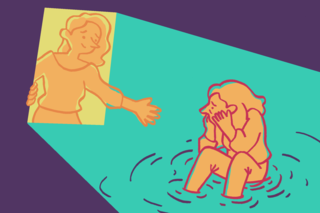Forgiveness
Making Peace With Your Regret
Psychological strategies for the healthy management of regret.
Posted August 4, 2020 Reviewed by Lybi Ma

If only I’d… I wish I’d… I wish I hadn’t… I should’ve…
Regret is an emotion. You feel badly because you believe you could’ve and should’ve done things differently. Regrets about education, relationships, parenting, health, and careers are common. Trauma, illness, assaults, and bereavement are big regret triggers. The pain they bring motivates people to look back and focus on what they should’ve done differently.
Regret is also cognitive. It’s uniquely human to imagine what we could’ve done instead of what we did. In psychology, this is called counterfactual thinking. Counterfactuals are thoughts about alternatives to past events—thoughts about what could’ve been. Our regrets are caused by “upward counterfactuals,” that is, imagining how things could’ve been better had we made different choices.
Individual differences affect our experience of regret. Some people don’t experience much regret because they don’t have the type of emotional intelligence associated with the self-examination necessary for regret. Other people use emotional shortcuts, like denial and blaming others, to quickly dispense with their regret. These regret-less people skip the pain of regret but miss out on the personal and relationship growth that comes from grappling with our regret.
Of course, some people go too far in the other direction, excessively ruminating (dwelling) on what they could’ve or should’ve done differently. Low self-esteem, anxiety, and depression are associated with an extremely self-critical brand of counterfactual thinking where people focus on their mistakes, both big and small. People who dwell (ruminate) on upward counterfactuals for months, and even years, experience the most distress.
Regret can reduce life satisfaction and have negative mental health outcomes. Alternatively, regret can be a source of growth and better decision-making. Here are some thoughts and strategies from psychology that can help you deal with, grow from, and discharge your regret.
Change Course
Regret is sometimes a signal from the self that can inspire needed change. Ask yourself: Can I go back to school, take better care of my health, learn how to express my anger, leave an unhealthy relationship, travel, reach out to restore a lost relationship, move, change jobs, etc.? Sometimes the best way to deal with your regret is to change course now to avoid greater regret later.
Change Your Narrative
Regret can be a product of an upward counterfactual fantasy that different choices would’ve yielded a far superior life. That’s why it’s helpful to rewrite this story you tell yourself. Imagine how things could’ve been worse instead of how they could’ve been better (create a “downward counterfactual”). Remind yourself that your fantasy version of your perfect alternative life is probably just that—a fantasy. No life or person is perfect. Relationships are challenging. Financial setbacks happen. Mistakes will be made. Different choices would likely have brought different regrets. Count your blessings and learn your lessons, and identify and give yourself credit for the things you did right.
Apologize and Make Amends
Thinking that our actions hurt someone else and wishing we’d done better by them can lead to shameful, guilt-infused regret. While you might think you deserve to eternally carry this regret as punishment for your sins, it’s healthier, and more beneficial to you and your “victim” to try to right your wrong. While you can’t go back in time and undo your mistake, you may be able to give an honest apology and make it up to your victim. They may forgive you and they might not even remember your offense or hold it against you. When apologies aren’t possible, you can write an unsent letter or you can get a chair, imagine the person you hurt sitting in it, and give your apology. You can also make amends by living, giving, and serving in ways that reflect the values violated by your original offense.
Cultivate Self-Compassion & Self-Forgiveness
It’s easy to look back and see what you could’ve done differently. You might even need to grieve for the alternative life you could’ve had. But don’t stay there too long. Take a warm-hearted look at the context of your choices and who you were and what your needs and motivations were at the time. Remember that you didn’t know then what you know now so give yourself grace and compassion. Psychologists aren’t suggesting that you make excuses or evade responsibility—you should take your reasonable share, just not more than is truly yours. But if your intentions were good or immaturity or factors beyond your control led you down the now-regretted path, maybe you should give yourself a break. Some therapists recommend you write a letter to yourself acknowledging your pain and anger at yourself, and why you now deserve self-forgiveness.
References
Buchanan, J., Summerville, A., Reb, J., & Lehmann, J. (2016). The Regret Elements Scale: Distinguishing the affective and cognitive components of regret. Judgment and Decision Making, 11, 275-286.
Byrne, R. M. (2016). Counterfactual thought. Annual Review of Psychology, 67, 135-157.
Cornish, M. A., & Wade, N. G. (2015). A therapeutic model of self‐forgiveness with intervention strategies for counselors. Journal of Counseling & Development, 93, 96-104.
Enright, R. D., & the Human Development Study Group. (1996). Counseling within the forgiveness triad: On forgiving, receiving forgiveness, and self-forgiveness. Counseling and Values, 40, 107–126.
Epstude, K., & Roese, N. J. (2008). The functional theory of counterfactual thinking. Personality and Social Psychology Review, 12, 168-192.
Greenberg, L. (2002). Emotion-focused therapy: Coaching clients to work through feelings. Washington, DC: American Psychological Association.
Righetti, F., & Visserman, M. (2018). I gave too much: Low self-esteem and the regret of sacrifices. Social Psychological and Personality Science, 9, 453-460.
Roese, N. J., & Summerville, A. (2005). What we regret most... and why. Personality and Social Psychology Bulletin, 31, 1273-1285.


